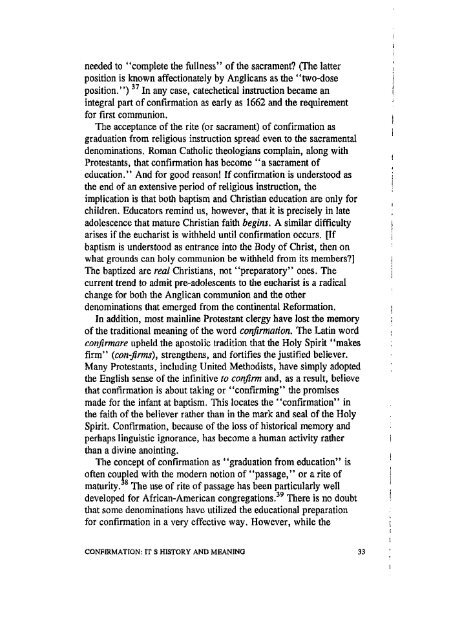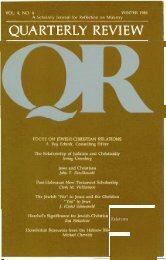TJieodore W. Jennings, Jr. The Meaning of ... - Quarterly Review
TJieodore W. Jennings, Jr. The Meaning of ... - Quarterly Review
TJieodore W. Jennings, Jr. The Meaning of ... - Quarterly Review
You also want an ePaper? Increase the reach of your titles
YUMPU automatically turns print PDFs into web optimized ePapers that Google loves.
needed to "complete the fullness" <strong>of</strong> the sacrament? (<strong>The</strong> latter<br />
position is known affectionately by Anglicans as the "two-dose<br />
position.") 37<br />
In any case, catechetical instruction became an<br />
integral part <strong>of</strong> confirmation as early as 1662 and the requirement<br />
for first communion.<br />
<strong>The</strong> acceptance <strong>of</strong> the rite (or sacrament) <strong>of</strong> confirmation as<br />
graduation from religious instruction spread even to the sacramental<br />
denominations. Roman Catholic theologians complain, along with<br />
Protestants, that confirmation has become "a sacrament <strong>of</strong><br />
education." And for good reason! If confirmation is understood as<br />
the end <strong>of</strong> an extensive period <strong>of</strong> religious instruction, the<br />
implication is that both baptism and Christian education are only for<br />
children. Educators remind us, however, that it is precisely in late<br />
adolescence that mature Christian faith begins. A similar difficulty<br />
arises if the eucharist is withheld until confirmation occurs. [If<br />
baptism is understood as entrance into the Body <strong>of</strong> Christ, then on<br />
what grounds can holy communion be withheld from its members?]<br />
<strong>The</strong> baptized are real Christians, not "preparatory" ones. <strong>The</strong><br />
current trend to admit pre-adolescents to the eucharist is a radical<br />
change for both the Anglican communion and the other<br />
denominations that emerged from the continental Reformation.<br />
In addition, most mainline Protestant clergy have lost the memory<br />
<strong>of</strong> the traditional meaning <strong>of</strong> the word confirmation. <strong>The</strong> Latin word<br />
confirmare upheld the apostolic tradition that the Holy Spirit "makes<br />
firm" {con-firms), strengthens, and fortifies the justified believer.<br />
Many Protestants, including United Methodists, have simply adopted<br />
the English sense <strong>of</strong> the infinitive to confirm and, as a result, believe<br />
that confirmation is about taking or "confirming" the promises<br />
made for the infant at baptism. This locates the "confirmation" in<br />
the faith <strong>of</strong> the believer rather than in the mark and seal <strong>of</strong> the Holy<br />
Spirit. Confirmation, because <strong>of</strong> the loss <strong>of</strong> historical memory and<br />
perhaps linguistic ignorance, has become a human activity rather<br />
than a divine anointing.<br />
<strong>The</strong> concept <strong>of</strong> confirmation as "graduation from education" is<br />
<strong>of</strong>ten coupled with the modern notion <strong>of</strong> "passage," or a rite <strong>of</strong><br />
maturity. <strong>The</strong> use <strong>of</strong> rite <strong>of</strong> passage has been particularly well<br />
developed for African-American congregations. 39<br />
<strong>The</strong>re is no doubt<br />
that some denominations have utilized the educational preparation<br />
for confirmation in a very effective way. However, while the<br />
CONFIRMATION: IT S HISTORY AND MEANING 33












